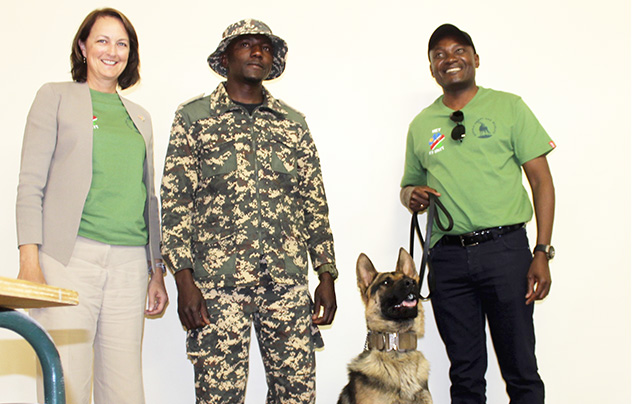THE environment ministry has inaugurated the dog unit that will be used for wildlife protection and law-enforcement.
Inaugurating the unit at Waterberg in the Otjozondjupa region, environment minister Pohamba Shifeta said Namibia’s elephants and rhinos particularly are affected by wildlife crime.
The unit comprises four German shepherds procured in Holland for N$240 000. One more dog was acquired last year.
Shifeta said funding was acquired from various sources, including the Save the Rhino Trust and the United States of America’s Fish and Wildlife Service.
He said his ministry has been focusing on the law-enforcement component of conservation to protect the country’s wildlife from illegal hunting.
“All four dogs are trained to search buildings, vehicles, baggage and open areas for firearms, ammunition and illegal wildlife products such as ivory, rhino horn, pangolin scales and bush meat,” he stated.
The minister explained that in 2017, they began to explore the potential of a dog unit through a partnership with Invictus K9, which specialises in the establishment and support of law-enforcement in canine units in Africa.
The dog unit will be used in the Etosha and Bwabwata national parks, as well as in other conservation areas and strategic points, airports and border posts.
The ministry plans to acquire three more dogs by the end of this year.
The United States of America’s ambassador to Namibia, Lisa Johnson, said the acquisition of the dogs complements other US government-funded programmes to combat wildlife crime.
“We want to stamp out poaching and trafficking, which harm Namibia’s economy,” she said.
Johnson noted that the support aims to balance the enforcement and human sides of conservation efforts.
Meanwhile, Shifeta said no portions of national parks will be turned into communal land.
National parks are protected state land, and cannot be de-gazetted to become communal land. Namibia has 20 state-run protected areas, covering about 17% of the country’s land surface.
He said with the second national land conference taking place next month, people are asking that parts of national parks be turned into communal land.
The minister stressed that the same people who are making the requests are those who already own large tracts of land supposedly acquired through traditional authorities.
“Let those who fenced off huge portions of communal land cut some portions off, and make provision for others first before they talk about national parks ,” the minister said.
Shifeta further stated that individuals who own huge portions of land are implicating traditional authorities falsely, as they do not have the power to allocate more than 20 hectares of land per person.
“In some areas, you will find that an individual has more than 2 000 hectares, which is illegal as per the Communal Land Reform Act,” he added.
Source: Nampa, Namibian.co.na








